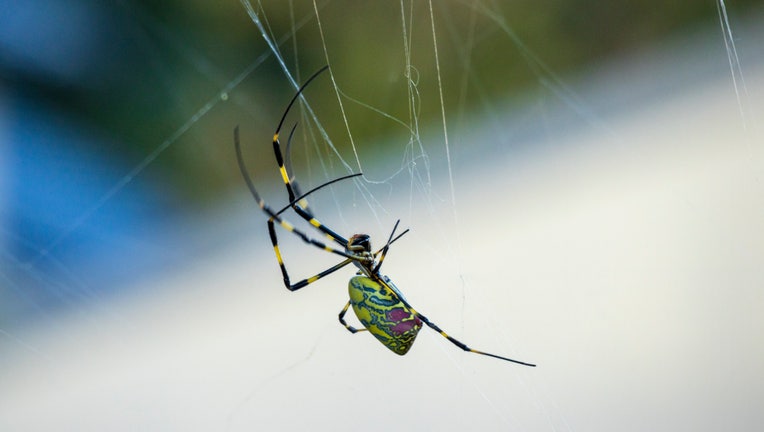Joro spiders known for giant webs poised to invade more US cities, study warns

A close-up view of a Giant Joro spider (Trichonephila clavata) seen along the Nakasendo Way between Sekigahara and Hosokute, Japan on November 5, 2022. (Photo by David Madison/Getty Images)
Researchers have been warning for months that a large, invasive spider species is poised to continue spreading through Georgia into cities along the East Coast.
A new study from the University of Georgia found even more evidence of the growing "urban tolerance" of the Joro spider.
The study looked at how Joro spiders can live next to busy roads, which are typically stressful environments for many animals.
Researchers simulated road vibrations and found that Joro spiders were somewhat less likely to attack simulated prey, but were otherwise found to be of the same mass and health.
"It looks like Joro spiders are not going to shy away from building a web under a stoplight or an area where you wouldn’t imagine a spider to be," said Alexa Schultz, a co-author of the study.
Joro spider size
The Joro — Trichonephila clavata — is part of a group of spiders known as orb weavers for their highly organized, wheel-shaped webs.
Joro females have colorful yellow, blue and red markings on their bodies and can measure three inches across when their legs are fully extended, which is about palm-sized.
Their golden webs are often found in unusual places, such as power lines, strewn across stoplights and even above gas pumps. The webs can span 10 feet or more, with support strands that can reach 20 feet or longer.
RELATED: Joro spiders could soon be 'parachuting' into New York: Are they harmful to humans?
Where are Joro spiders in the US?
Joro spiders are native to Japan, but in September 2021, researchers found they had made their way to northeast Georgia. The first Joros to arrive in the U.S. were likely stowaways on shipping containers.
The spider has also been spotted in South Carolina and entomologists expect it to spread throughout the Southeast.
The Joro appears better suited to colder temperatures than a related species, researchers at the University of Georgia said in a 2022 paper. It has about double the metabolism, a 77% higher heart rate and can survive a brief freeze that kills off its relatives, that study found.
RELATED: Invasive Joro spider won't leave Georgia any time soon, study shows
Are Joro spiders poisonous?
Joro spiders are not poisonous and, in fact, have been referred to as "gentle giants" because they do not pose danger to humans or pets.
An earlier study from UGA shows the Joro spider "may be the shyest spider ever documented."
They're easily startled. One experiment showed they freeze up, sometimes staying still for over an hour when disturbed. Most spiders pause for less than a minute.
Joros will not bite people or pets unless they are cornered. However, their bites are fairly harmless. The UGA report shows their fangs aren't large enough to pierce the skin.
This story was reported from Detroit. FOX 5 Atlanta contributed.

